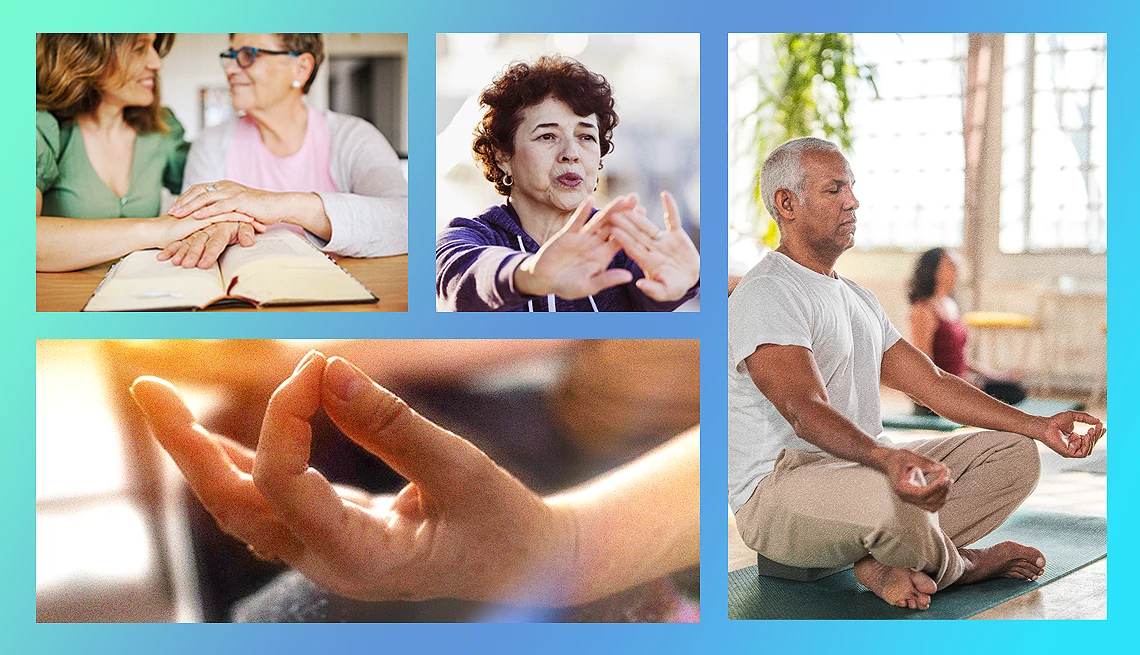AARP Hearing Center


Six months into my husband’s recovery from traumatic brain injury, he was gradually regaining words and strength. Caring for him and our four children, working part-time and running the household left me utterly exhausted. One morning, I’d gotten the children to school, my husband off to rehab and I collapsed, sobbing, worried about our family’s uncertain future.
I saw a sudden flash of light behind my eyes and a voice inside my head said, “It’s going to be OK.” I was infused with an immediate sense of calm and peace.


AARP Membership— $12 for your first year when you sign up for Automatic Renewal
Get instant access to members-only products and hundreds of discounts, a free second membership, and a subscription to AARP the Magazine.
Over the years, I’ve thought a lot about that moment. I was raised in the Christian faith, and there are things I believe and others that, to me, feel more like tradition. But in that moment, my fear and worry dissolving, I was exercising a combination of faith and spirituality. And it had stopped me from falling into a place of darkness.
Faith vs. spirituality
The simplest way people have described the difference between faith and spirituality is that faith is the “religion piece” that’s lived out in community, such as places of worship. Spirituality is more of an individual journey, an opportunity to deepen one’s sense of containment, wholeness and ability to find peace and purpose, especially when it comes to caregiving.
I was curious about how faith and spirituality help other caregivers so I posed that question in the AARP Family Caregivers Discussion Group on Facebook. I received many thoughtful replies. Some credited the power of prayer and belief in God to creating a greater sense of well-being and calm; others relied on deep breathing, meditation and mindfulness exercises. Many spoke to how practicing the art of gratitude, feeling a sense of purpose, the love of friends and family and looking for small moments in each day — from lightning bugs to sunsets — help them navigate tough times.
Angela Grubbs Jindra, 52, from Chattanooga, Tennessee, writes, “I listen to books on mindfulness over and over again.” Vicki McHugh, 66, from Bayhead, New Jersey, comments she “couldn’t have kept the stamina and positive attitude caring for daughter [with] 24/7 health challenges at a young age, then my mom’s last 12 years of life, if I didn’t have faith, coupled with a dear friend, [that] was my secret sauce.”
Robin Brown*, 67, from Cleveland, leans into her faith and also wrestles with it while caregiving loved ones. “Although I am agnostic, I embrace much of the Jewish faith and custom in which I was raised. In spite of hoping for something better, I have trouble believing a God filled with love would inflict our loved ones, and consequently us, with what we’re dealing with.”
Providing structure around caregiving
Joy Miller, 73, from Peoria, Illinois, is a licensed clinical professional counselor with a specialty in trauma and the Holocaust. She is also a caregiver to her husband, John Miller, 74, who has Parkinson’s disease and dementia.
“Caregiving puts us in a situation where you have no experience and a lot rides on you,” says Miller. “For many caregivers the faith perspective helps them cope, gives them a listening ear to a higher power and in some way becomes the structure that provides the ‘why’ or the purpose behind it.”
Miller has witnessed how people without a strong faith often need to find other coping techniques as caregivers. “That’s when spirituality can help people access that higher power in a more personal way, with things that bring meaning and joy,” she adds.

































































More From AARP
25 Great Ways to Build Healthy Habits
These tips can help create changes that positively impact your well-being for years to comeHow Caregivers Can Spot Malnutrition Symptoms
Learn the common signs and symptoms and what to do about themCreate a Respite Care Plan to Give Caregivers a Break
Learn what services and programs are available to help